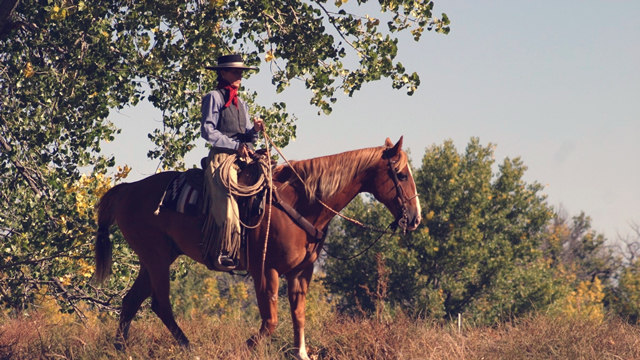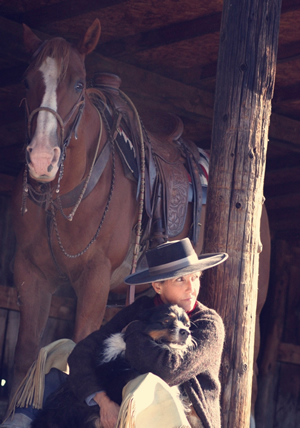Interviews and Community
Ten Questions Answered by Gwynn Turnbull Weaver
1. How did you get involved with horses?
I was an eastern-born, California-raised “town kid,” the proverbial black sheep when it came to dreams and later my profession. I saved up three hundred bucks by the time I hit 12 and was allowed to buy my first horse. She cost $300, but the guy that sold her to me dropped the price so I’d have enough left over to buy a bridle. That was it. Bareback and broke but the happiest twelve-year-old alive.
2. What one word describes your ideal horse-human relationship?
Respect. And I mean that in the warmest, most heartfelt way.
3. What are your current professional goals?
I feel the need to define and present a philosophy and lifestyle to horsemen/horsewomen that stands firmly on tradition, yet blends ethics, morality and conscience. To do that I will build and develop the event (The Californios Ranch Roping and Stock Horse Contest) so that its existence is financially secure; strengthen and enrich the newsletter (The Californios Quarterly); and develop a strong and stable market for horses raised and made in this way.
4. Do you see yourself as part of a larger community of horse people, and if so, how do you fit into that community?
I don’t feel that I have the liberty to belong to any one group. I think that would weaken my stance and I would have less to offer. I think when we define ourselves as a particular thing or part of a particular group, we limit ourselves. I think our choices all along the way, so long as they are sincere, will define us. The less I think about labels and the more I think about trying to keep my decisions honest, the better off I seem to be.
5. What horse-related product do you use that makes your life easier?
I have one of the Harwood saddles that I really enjoy. It fits a lot of different horses, doesn’t hurt them and offers me a good platform to throw from and dally to. I think a person shouldn’t try to cut corners on quality with the saddle they ride. If you and your horse are both comfortable, a lot more good is going to come from that union.
6. What is the most important character trait for a great horseman to possess? Why?
I think what’s not there is what’s important: an ego. The greatest horsemen I’ve had the honor of knowing kept their ego out of it. When a horse wasn’t getting what they were trying to get across, they didn’t take it personally. They didn’t think the horse was trying to insult them or their training ability. They just quietly kept searching for another way to get the information communicated. I find that, when training, getting angry is a sure sign I’ve come to the end of my knowledge. I’m the most successful when I realize that, and am thankful that that particular horse was there to expose my deficiency. I am then free to work on closing that loophole in my knowledge. If that horse and I hadn’t met, I may never have had that opportunity. I can’t always achieve that mindset, but I strive for it.
7. What do you get out of working with horses? What do you give?
Horses keep me honest. You just can’t snow them. They know what you know and what you don’t know. They “throw the B.S. flag” on me when I think I’m better than I am. But by doing that they also bring out the best in me. What do I give? All I can offer is my sincerity, whatever form that may take.
8. Who is a favorite horse of all time?
My first one, of course. Crickett. She gave me lots of room to make mistakes, forgave me for my ignorance, protected me from myself. She died a few years after I bought her, a fluke illness. She even helped me with her death, forcing me to move on to the next level. I’ll spend my whole life thanking her or attempting to by the way I treat and regard all the
horses since and all the horses to come. She was the purest kind of joy.
9. What horseman living or deceased would you most like to study with? Why?
That is a tough one. There are several people I would like to ride with, some well known, others unknown, still others long dead. To choose one would devalue the others and I can’t do that—won’t do it. So many have so many different things to offer. Again, I don’t want to limit myself; I need all the assistance I can get.
10. What is a very memorable horse moment?
One summer, working in Wyoming, I was wrangling about 70 head of saddle horses in at dawn. The corrals were straight east of the field. The horses always boiled ahead of me at a high lope, up over a rocky cobbled hill, then down into the corral. One morning the timing was just right. They crested the hill just as the sun peaked over the horizon, its rays streaming through them, lighting their manes and tails as if on fire; in the same moment they hit the rocky top and their horseshoes littered the ground with glowing orange sparks. The light and the sparks were so brilliant at that moment, my breath caught in my throat. In an instant it was all gone and they dropped out of view, the sparks twinkling away. I still thank God that I was there to see that, horseback and young.
Gwynn Turnbull Weaver, a Northern California horsewoman, has been immersed in many different equine disciplines, from horse shows, to cutting to rodeo. In 1996 her interests finally found a home in the old California reined cow horse, studying the discipline and working to apply it to the real-life situations of practical ranch work. She created and directed The Californios Ranch Roping and Stock Horse Contest in 2000 to give followers of the discipline a place to compete. In 2001 she published The Californios Quarterly, a newsletter designed to promote and support the event and its buckaroo lifestyle. Gwynn Turnbull Weaver and David Weaver winter just outside of Orland, California, and spend their summers traveling the western U.S. doing ranch roping clinics while still working for various”big outfits” on the northern ranges.
This article originally appeared in Eclectic Horseman Issue No.10



